145 Stories about Karma (Cause and Effect)
with Pictures and Poems
CW43_No.145
Translated and edited by the Buddhist Yogi C. M. Chen
The Clay Deity Kills the Unfilial Son
The unfilial son's name is unknown, but the story is true. He treated his mother like a maid. He and his wife were lazy and got up late. All house work was done by his mother. Once his mother worked in the kitchen and took care of her son's infant there. The infant fell into a cauldron full of boiling water and died. For fear of her son's punishment she escaped to a temple, hiding under the table of the clay statue of the deity whose name was Chow Tung, and prayed for saving her life. Her son was angry and ran after her with a knife. God Chow Tung in a clay image jumped out and stood against the gate. Before the unfilial son could kill his mother, he was killed by the God. Every person of the local area saw this.
Poem
The cruel son wants to kill mother with knife,
She hides in the God's temple to save her life.
The God image even is made of clay,
He cuts off the son's head and hurts his wife!
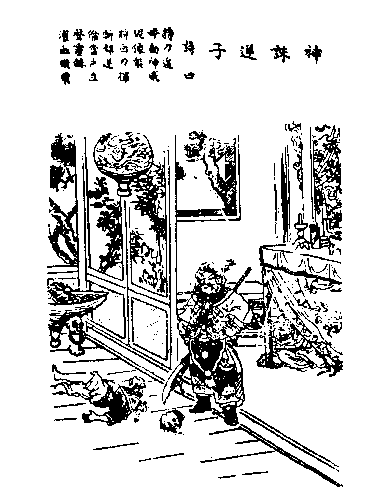 |
Thunder God Struck an Unfilial Son Dead
This was an historical event which happened on the twenty-third of May, the first year of Konshih of the Ching Dynasty (1662). The unfilial son named Ou had a cruel temper like a gangster, scolding his mother very often. One day he came back from his business. He was very angry with his mother because the lunch preparation was too late. He cried out against his mother and railed at her in well set terms. It made the Thunder God's heart burn with fire and fury and he struck the unfilial son dead, cut off his head at his mother's feet, and threw his body out of the door, blood dripping on the floor. Hundreds of persons around his village did see this. They advised one another by saying: "Those who scold their parents should see this example of punishment!"
Poem
He always blamed his mother like mad.
The largest barrel could not hide his head.
He was killed by the God of Thunder.
It caused all his neighbors to be so sad!
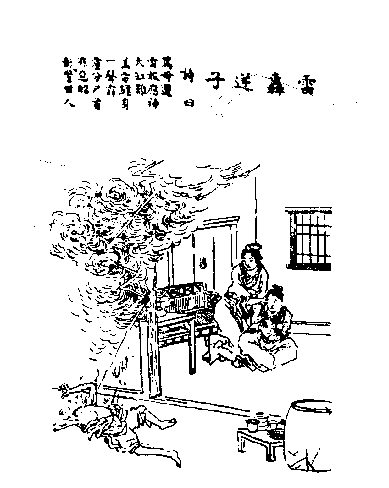 |
Lun Fan Eats His Own Fruit
Mr. Lun Fan was a business man of the An Ping district. His father died when he was still an infant. His mother lived under very difficult circumstances. He was taken care of by his mother and grew up. When his business became better, he then left his old mother alone in An Ping and brought his wife and his children to Fu San where he set up his business and gradually became rich. His friend advised him by saying: "You have now become rich, you should invite your old mother here, and let her have a good time to pass her old age." He refused and said: "My mother has a little farm. She still can work to get some production to feed herself." His friend disliked this answer and thought to himself that leaving his old mother will get no good result. Afterward it so happened. His sons were as bad as he was himself, his wife dies, and he became poor again. Every neighbor said: "Lun Fan eats his own fruit!"
This is a very good lesson for most American students to learn.
Poem
Left his mother, with his wife to live;
Like root corrupted, how to grow the leaf?!
Lun Fan has unfilial sons too,
And died himself like a poor thief!
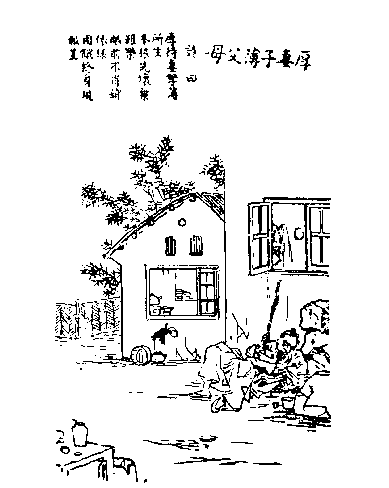 |
He Abandoned His Mother, Gets Murdered
Loa Ju the official was a Manchu who brought his wife to his office place and abandoned his blind and old mother at home. He cheated his mother by saying: "I shall invite you to my office, and I have paid your rent for one year. I have trusted my bank to send you your livelihood monthly." His mother believed him. After one month, the landlord came to his mother for the rent and no friend sent any money to her. His mother cried day and night and said to God: "Such a cheater and unfilial son; if he is still alive, might you have no power!" As he had brought much money with him which was seen by the master of his traveling boat, when his assistant official had gone to see a show, the boat master killed him and his wife, threw their corpses into the river and escaped away with all of his money. God is never without power to punish such an unfilial son!
Poem
He goes far away from his Ma, takes no leave.
He is killed in a small boat without relief.
The boat man takes all his wealth and throws his corpse.
God doesn't allow an unfilial one to live!
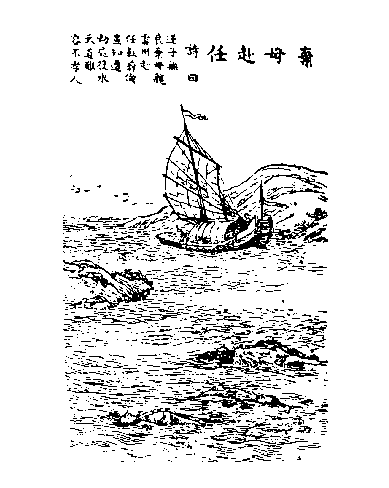 |
Unfilial Son Becomes an Ass
In the reign Chin-Teh (1506-1522) of the Ming Dynasty, in the Ping-Yang district, there was an unfilial son named Chow-Ging. He was very proud of his little ability. He blamed his father very often. His father was kind and a coward who dared not forbid his son to do so. Once the unfilial son struck his own son. His father advised him against it. He became very angry with his father and said: "I strike my own son who is not your son, why interfere?"
During that night the unfilial son's spirit was caught by Yama and punished by becoming an ass. He rejected his punishment by saying: "I have done no sin!" Yama said: "You always blame your father and are proud as if there is nobody who is better than you. You must become an ass without eyes, you will always turn a heavy mill and get flogged many times." When his spirit awoke, he told his father and then died. The next morning his neighbor informed his father that he got a baby ass with Chow-Ging's name on its forehead and it was blind!
Poem
He's like beast with habit so low,
Blames his father , treats him as cow.
At last he becomes a blind ass.
He is cast by the Yama's law!
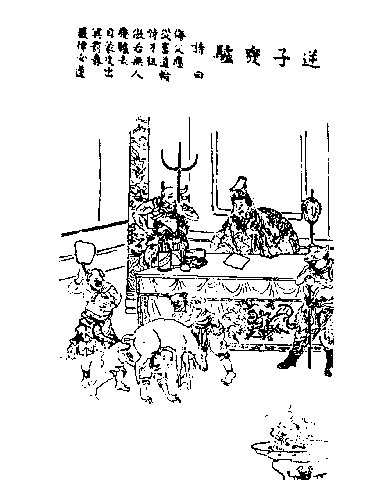 |
God Sent His Black Tiger to Kill the Lecher
The lecher was a wood-seller. He wanted to lure the beautiful widow of a dye shop in the Nee-Shin district, but the widow was very chaste. The lecher made a trap by throwing some of his wood into her house at night and then brought false charges against her at the police office where he offered a lot of bribes in order to force her to marry him. As she was an earnest believer in the God whose name was Chou Hsuan Tan, called by Taoists as Chou Marshal, possessed of the power to win all litigations and destroy all traps, and who rides on a black tiger. She prayed to him with tears. She dreamed that this God consoled her by saying: "I shall send my black tiger to kill him." After just one day the lecher went to the mountains to collect wood and a black tiger bit his head off!
Poem
He loves a widow who is in hunger.
He then lures her with food but gets anger.
Again he makes her a big slander.
She prays and he is killed by tiger.
 |
Adultery Gets Bad Result
Mr. Lue was a lecher of Yu-Ken district. His father didn't educate him at all and allowed his son to have his own way. Lue lay with his sisters and maids. Afterwards all Lue's children died. He was put into jail for adultery. He became poor and ill. Nobody came to see him. After he died, nobody gave him a coffin. His corpse was exposed outdoors, full of maggots. Everyone passed there said the same thing, "Adultery gets a bad result!"
In America, adult book stores and adult theaters can be found in every city. The statistics of the crimes of adultery increase every year. People still want more freedom of love, even the Fathers of the Church want to marry. How could I tell this story to all of them?
Poem
He commits many times of adultery.
He gets many diseases and calamity.
He has been punished by office and so poor:
Nobody sends his corpse to cemetery.
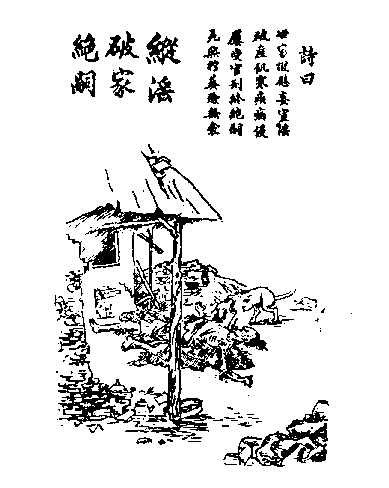 |
Raping a Nun Gets Punishment of Suicide
Sue Chou-Shin of the Chin-kun district was a scholar of the third degree of the old system. He was going to visit his teacher and passed by a nunnery. With a sharp glimpse he saw a young and beautiful nun inside. He loved her very much and he didn't take care of his good fame but forced her to be defiled. When he came back to himself he cut off his tongue and penis and died. This was not a suicide. In his mind there was the God who occupied his whole mind and caused him to do so. All Gods do have such powers whether directly and personally to kill the lecher or send their family to do so or occupy the lecher's mind to perform their punishment. Nowadays we read in newspapers of many suicides concerning adultery which belong to this kind. Those atheists not believing in God mistake these acts for suicides.
Poem
From past life merits, he gets scholarship so high.
After raping a nun, he kills himself and dies.
All his mind God does occupy.
The Atheists call it a suicide.
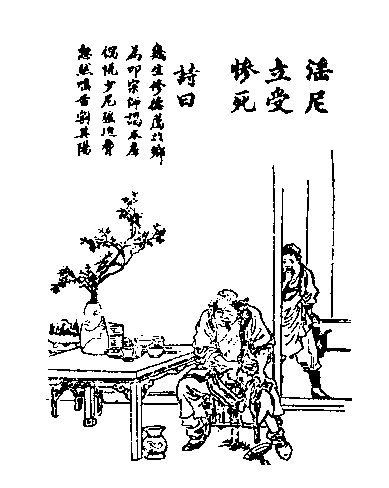 |
He Who Stops Adultery Gets Good Conditions
Hwa-Ting Chang was a bad boy committing adultery many times. He had two children who all died as infants. He himself suffered from V.D. for a long time. Once he read some book on the Law of Cause and Effect. He repented and kneeled down before a God's image and confessed that he would not commit adultery again. He also reprinted that kind of book and distributed it freely to many people. His disease of V.D. was cured and he became very healthy. After a few years he had three children, all boys, who grew up under good conditions.
Poem
Through adultery he gets disease for years.
By repentance he is cured without fears!
He gives freely a lot of Buddhist books,
And gets three good sons many people do hear!
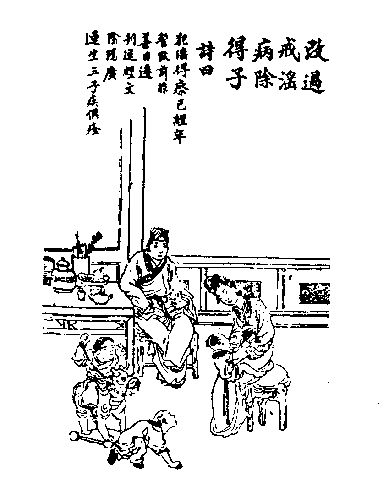 |
Confession Removes the Black Flag
Ms. Chou married Mr. Chen. She always criticized her father-in-law and mother-in-law and was ungrateful without filial piety. Once she was combing her hair before a mirror in which she suddenly saw a black flag appearing on her shoulder in her reflection. She was frightened. At that same time her terrified manner was seen by her neighbor lady who was passing by there. She asked, 'Why are you so fearful?" Mrs. Chen told her neighbor. The neighbor advised, "A few years ago one lady had the same thing happened and she was killed by the God of Thunder. You are newly married and have not done a lot of unfilial things to your parents-in-law, so you will not be punished if you confess in time." Then she asked her mother-in-law to forgive her. She never saw the black flag appearing on her shoulder again. She became a really good daughter-in-law.
It is still better than confession if you would have filial piety with good manners towards everyone.
Poem
She does not believe one may be killed by thunder.
She is unfilial and is filled with a great wonder.
She saw a big black flag on her left shoulder.
After repentance she is a good householder.
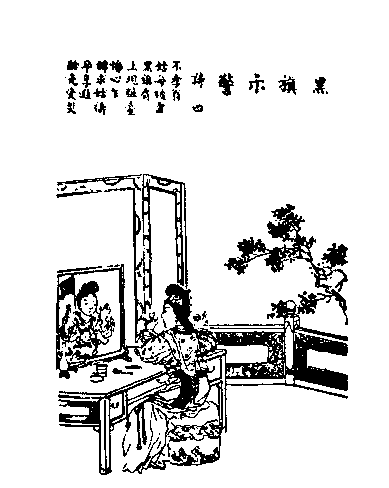 |
Helping Others Gets Good Result
Mr. Tsai Chi-Chung had no sons when he was forty, so his wife let him marry a concubine. The bride cried before her bridegroom and told him, "I am already married but in order to pay some debts, my husband got some money from your wife and I must remarry you!" Mr. Tsai immediately went to her husband and slept there. The next morning his wife sent the bride back and presented her husband some money until he had enough to pay his debts. Afterwards Mr. Tsai received a very high official job and his wife gave birth to two good sons. This was the good result of their helpfulness.
Poem
He gets concubine from a second hand,
But he sends her back to her own husband,
And gives them some money to pay their debt.
He gets two sons and so rich till his end.
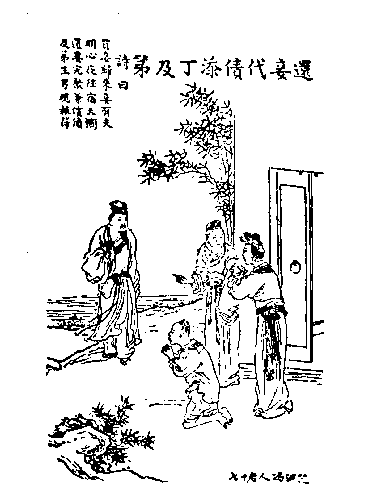 |
Good Reward for the Filial Person
Mr. Pon-Yu was a filial son. His mother died in his childhood. His father was very stern and got angry very easily. Whenever he met his anger, he kneeled down and asked for forgiveness. He had two young brothers but his father, when he was alive, didn't arrange marriages for them. After his father died, he arranged marriages for them just as his father should have done. Because his family was poor, he diligently worked on a farm and became rich. Four coffins of his late kinsmen which were put in a wild place he properly buried with his own money and not that of his brothers. He worshipped not only God but also the Dragon King. Once he was in a boat with fifty other people in the dangerous condition of a hurricane. He prayed to the Dragon King. They all smelled a very good odor and all saw a golden light. Other vessels sank, but his ship was saved and the fifty persons in the same ship did give him thanks. He had three very good sons, all of whom became high officials of the central government.
Poem
Naturally he has very filial piety.
Four times he settled his kinsmen in cemetery.
Not only his offspring became great officials,
But also he's freed from typhoon calamity.
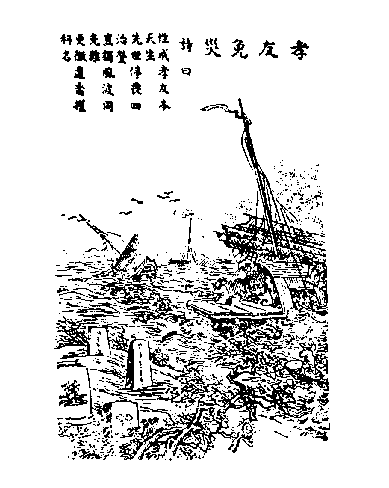 |
Turn Bad Conditions into Good Ones
Wang Chen-Hwo was a person of the Nee-Shin district. He was poor and sick but loved his children very much. He learned Buddhism and did know that all his bad conditions were the bad results of his past lives. He became much more full of filial piety towards his parents. When there was a famine, he let his parents eat while he himself suffered from hunger. When it was winter he wore thin clothes and let his parents have enough clothes to keep warm. When his parents had some illness he gave them medicine and prayed to God for their longevity. One night he dreamed that the God told him, "Your destiny is that you should not live long and always be poor, but you have done so much goodness which is able to turn it over, so you will surely have a long life and be rich." Afterwards, this saying of God became true.
Poem
From himself who loves his daughter and son,
He knows his own parents loved him so long.
Both this kindness and filial piety,
Makes him rich, have longevity, and strong.
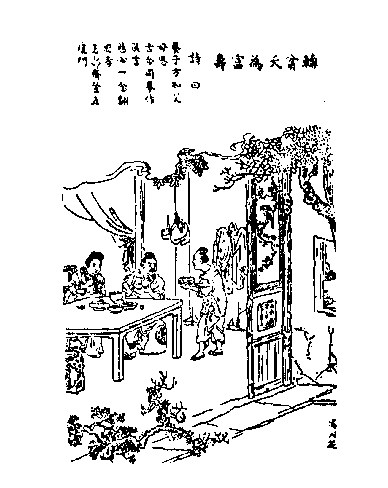 |
The Fidelity-Widow Becomes Fairy
Mr. Fun Jui-Yu's wife Mrs. Hu Fun was very beautiful but of a poor family. She gave birth to a son. When she was only twenty-three her husband died. Many rich persons wanted to marry her but she refused by saying, "I would rather be a hungry ghost than remarry and become a rich lady." She diligently embroidered in the day time and weaved during the night time and sold those works to get some money to feed her grandmother-in-law and her son. She herself took only simple rice but she cooked some meat for her grandmother-in-law. She always told her neighbors that since her husband died, there were only her grandmother-in-law and her son who remained and she had to feed them well in order to console her late husband in his tomb. All her neighbors praised her. When the village had a fire, her house was saved by the help of God who sent a resistant wind to stop the fire. Afterwards, her son became a rich business man and she died at age ninety-five. Every neighbor saw in the sky that she was a fairy with many angels around her flying to heaven.
Poem
She would rather be a hunger ghost
Than to remarry and lose her chastity.
She works and feeds her whole family;
She becomes rich and died a deity.
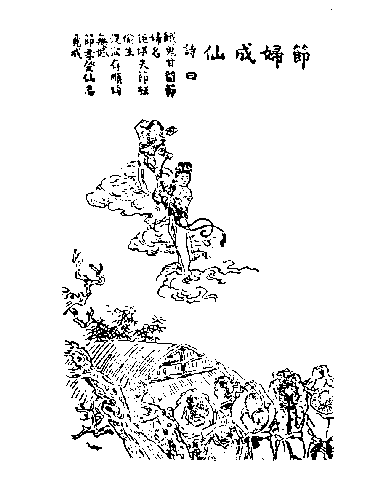 |
The Filial Beggar Becomes Fairy
In the Shen-Ju district there was a beggar whose name was Yung-Sen. He was a very filial son of his old mother. They lived in a destroyed temple. Whenever he got some good food he gave it to his mother. He took only the bad food. During the summer he moved his mother to sit under a large pine tree. At night when there were many mosquitoes, he fanned them away without tire. When his mother had some sadness, he danced and sang before her to make her happy. Most people of the same district did know him as a filial beggar. Mr. Sen helped him a lot. When this beggar died, Sen also died on the same date. The beggar was in a good carriage where Yama welcomed him and called him a deity. When the beggar saw Mr. Sen also died, he asked Yama, "Mr. Sen is still young; why does he die? He is my benefactor." Yama replied, "His destiny is a short life; as you call him your benefactor, he may live twelve more years. I will send him back." Hence, this story was told by Mr. Sen to the world. All did know the filial beggar became a Fairy!
Poem
He begs to feed his mother so long.
When he dies a fairy he becomes.
If the dead Sen did not come back here,
Who knows this story was not wrong!
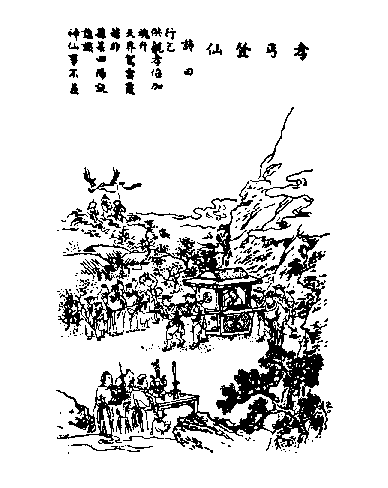 |
[Home][Back to main list][Back to Chenian][Go to Dr. Lin's works]